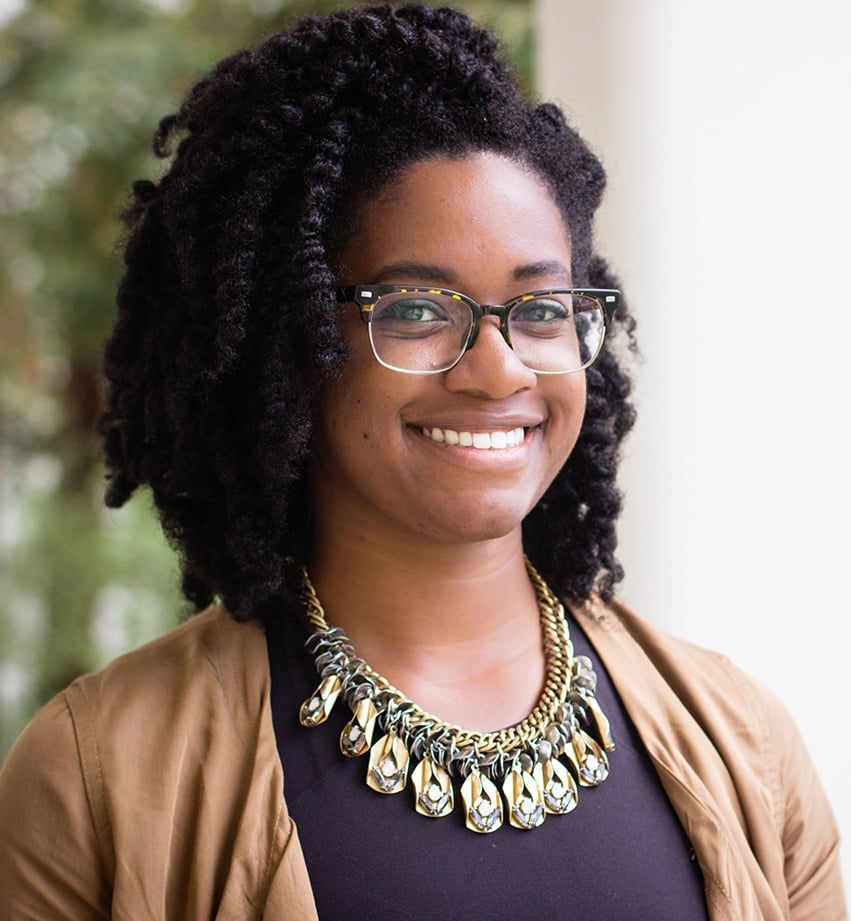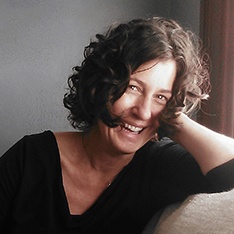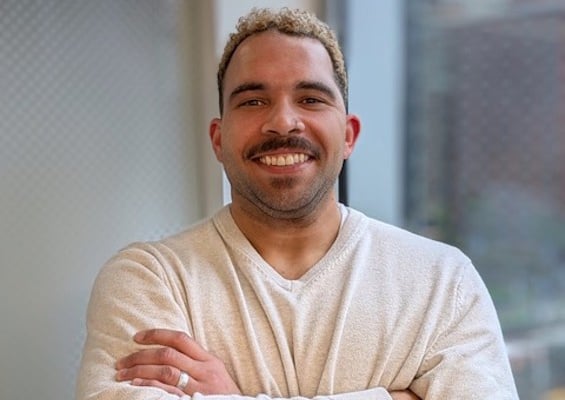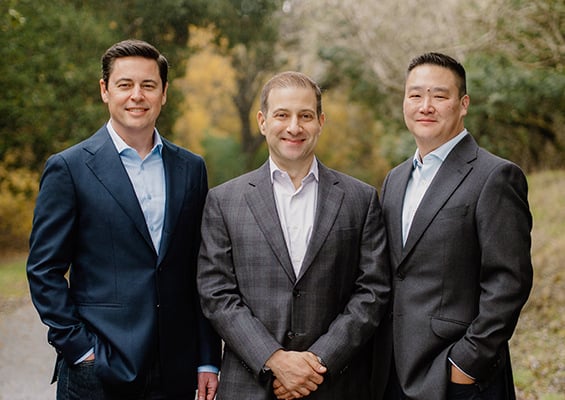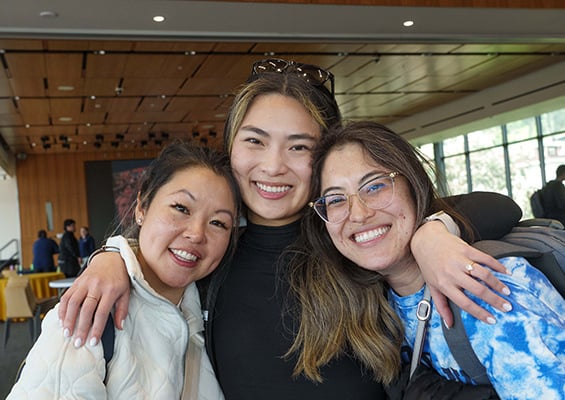When Sharifa Dunn woke up Nov. 9, 2016, the first big news she got was that Donald Trump had been elected president of the United States.
The second big news she got was that she been elected president of the MBA Association—the student government for the Full-time Berkeley MBA program.
"I feel like I'll never forget that day—I had gone to bed early the night before without waiting for the results," said Dunn, MBA 18, a New Jersey native who worked as an associate JP Morgan before beginning the MBA program.
The election, and the events that ensued, turned into a different kind of leadership test than Dunn had expected when she decided to run for MBAA president soon after starting the program. The past year has brought lessons not only in how to balance academics with a high-profile leadership role, but also in how to navigate a charged political environment while still being inclusive.
As she passes the baton to her successor—Conor Farese, newly elected MBAA president for the Class of 2019—Dunn reflected on the experience.
Q: You were able to fall asleep on election night without knowing the outcome?
A: Well there was no other option—it was out of my control. When I found that Trump had won, I spent most of the morning in class crying and being sad for our community, our country, for myself as a black woman, a daughter of immigrants, and how my world could change.
Later that day, I was sitting in the Haas courtyard with my marketing class team. We were talking through a marketing strategy and it felt surreal because everything had shifted in the last twelve hours.
Then I got a call from Derek (Kenmotsu), who was my predecessor as MBAA president, to congratulate me. I was happy, but I felt like I couldn't be too happy because it was against the backdrop of a president whose ideals and were the complete opposite of mine. Even though I was given this great responsibility and great honor, it seemed trivial when there were so many bigger things happening.
Later that night I called my parents and told them I had won the election. My dad, the ever-practical person he is, said "Make sure you still focus on your studies. Make sure this doesn't get in the way of what you're meant to be there for." For me, that was a confirmation that no matter what is happening, life must go on and life does go on. He gave me the allowance to be happy about it. And then I had all my classmates coming in, congratulating me which was also very nice.
I still think about the day—it was so hard but I also was excited. It was a bittersweet victory.
 Above: Sharifa with classmates on an MBA trek to New Zealand
Above: Sharifa with classmates on an MBA trek to New Zealand
Q: So that's been the backdrop of your experience as MBAA president. You started the term right around the presidential inauguration, when a lot of people were feeling on edge.
A: Our term officially started Jan. 1, and soon after I had my first big leadership lesson. A couple of 2nd-year MBA students had written a petition to the dean basically asking him to denounce the principles of the president. They had come to me and the MBAA leadership team to help them communicate with the community and get people to sign. Myself and another person went in and tried to wordsmith it, so that it seemed we weren't really telling people to do something, but just communicating about it. I thought we did a great job of staying somewhat neutral. We signed it as the MBAA because I assumed everyone would be on board with this kind of initiative. But, I later found out, everyone was not. It was a tough lesson for me to learn.
That was one of my first lessons in understanding interpersonal and team dynamics and not making assumptions about what people are thinking and what people believe. And even if they do believe what you believe, they don't necessarily want you speaking for them. You still need to make sure you're getting the buy-in from your entire team.
We walked away with a better messaging strategy on how we as a student government wanted to be. We decided we'd separate our own individual political views from the broader MBAA mission, because at the end of the day we all agreed that we wanted to be as inclusive as possible. Not every person in our community shares the same views, and we're not here to push our beliefs or promote certain political views over others.
Q: Has that continued to be a major theme over the past year? We've had a lot of turmoil on campus, especially with the battles over free speech.
A: We definitely have been operating against that backdrop, but early on, I thought it was going to be a bigger part of our agenda. We've been called on a lot to take a stand on lots of issues that affect members of our community, such as the executive orders, and it's been quite challenging to try balance what we the MBAA to be as an organization versus own political views. It's a push and pull, and I think most of our community has been understanding. We're getting better at it each time it comes up.

Above: Hiking on the MBA New Zealand trek
Q: Let's take a step back: Why did you decide to run for MBA president in the first place?
A: At first, I didn't know if I wanted to do it. I had never served in a role like this. It was a last-minute decision to put myself out there, and it really came down to pushing out of my comfort zone and figuring out where I could challenge myself. One of those areas was interpersonal skills, public speaking, and being able to take command of my space. I thought the role of president would allow me to do a lot of those things.
It was tough because I moved out here on my own from New York. This is the first time I've lived more than two hours from my family. But that was part of the reason I wanted to come here, just be able to spread my wings and really figure out who I was, separate and apart from my family and my twin sister. We had lived together every year except freshmen year of college. So, moving here was an opportunity for that relationship to grow while being apart. It was also tough for me trying to adjust to a new culture. East Coast culture is quite different from the West Coast. But I did find that the people I encountered were people I wanted to get to know more.
Q: What did you think of Berkeley Haas culture?
A lot of people talk about the culture of Haas and that being one of the biggest draws. I remember when I came here everyone was talking about the dean and his Defining Principles, and you're kind of like "What are they drinking out there?". Especially being a New Yorker and being very skeptical of everything. And I didn't really realize how deep it actually runs. When you think about the four principles, and how they manifest in everyone here, it's kind of shocking and amazing. I felt honored to be a part of this community.
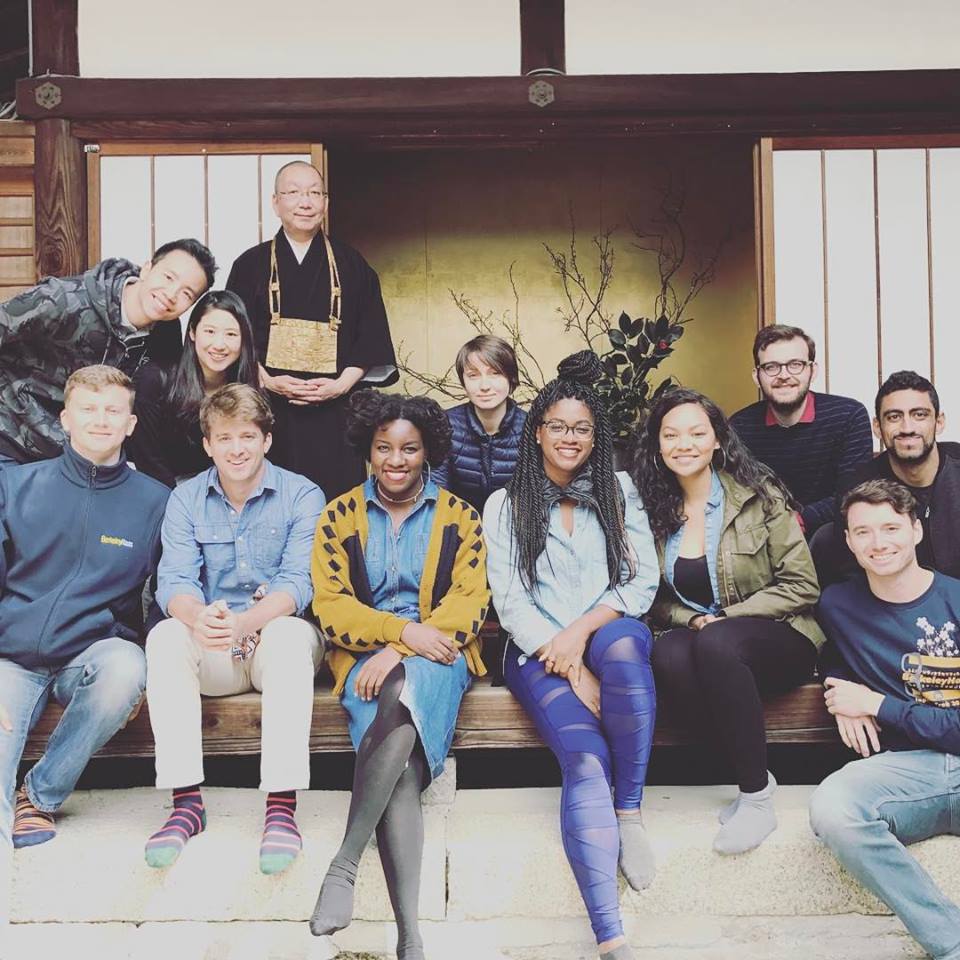 Above: Sharifa and classmates on an MBA Japan trek
Above: Sharifa and classmates on an MBA Japan trek
Q: What was your platform?
A: When I thought about running, I thought about some of the things I wanted to change in this community to push it forward and to build on the shoulders of those who have come before us. In terms of my platform, I didn't want to limit myself too much since we have VPs who focus on specific areas. Part of it was being from the East Coast, being a woman of color, and bringing in a different perspective. In addition, there were some operational efficiencies I wanted to work on, and find out where we could do better in terms of communication. And then lastly, the one that steered my heart was around normalizing a culture of self-care. We're in this high-performing environment, and there's never this acknowledgement of "Wow, I'm stressed". I wanted people to know it's OK to feel that way. As students, we have to balance the academic, professional, and social, and the self-care piece is often forgotten. I wanted to bring that to the forefront.
Q: What does the role of MBAA president involve?
A: It's a very much a project enrichment role, for lack of a better phrase, because I have a line of sight into what all the VPs are doing. When I see two people coming at a similar initiative from different angles, I can suggest they partner up. There is really a lot of coordination and communication. It's also about creating an environment where people feel welcome and they can share their opinion. I think a lot of the VPs hit their stride in terms of initiatives, and I want to make sure everyone had opportunities to stretch themselves.
Another big part of my job is managing the relationship with the school administration and making sure that we're setting up the team after us for success. When we leave office, we want to make sure the next class continues the momentum.
Q: Has it been worth it to take on this role while also being an MBA student?
A: Yes…I hesitate a little because I feel a lot of different ways about it. It's tested me in ways that I hadn't expected and given me skills in management and interpersonal skills that I wanted. It's also taken a lot of time—it's a challenge to stay focused sometimes. And it's been fast—by the time you learn the job, it's over. It's just been a wild, crazy arduous journey, and I'll be happy to give up the reins and enjoy the last semester of my second year.
I guess the bottom line is it's been an honor to step up into this role, to be a leader of leaders and to have the faith and support of my classmates. Feeling that I could do something like this one of the reasons I came here. Not to sound cheesy, but it makes my heart feel very full.




